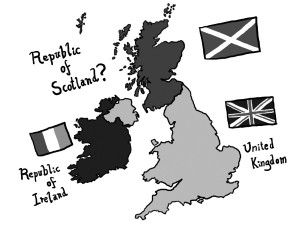Scots should vote in favor of independence
On Sept. 18, Scots will have the opportunity to make history by deciding whether or not to sever its 307-year union with the United Kingdom and become independent, according to The New York Times. Though U.K. Prime Minister David Cameron recently said that an independent Scotland would weaken Great Britain as a whole, such a historic move would strengthen Scottish interests.
Independence would give Scotland the opportunity to focus on its own national issues. Though Great Britain does provide a sense of security and stability for Scotland, that does not distract from the fact that Scottish interests are always secondary to the interests of the United Kingdom as a whole. For example, the Scottish government is strongly opposed to the bedroom tax (a housing tax) claiming that it disproportionately affects Scots. Scotland’s share of claimants affected by the bedroom tax is around 16 percent compared with Great Britain’s population share of 8.6 percent. Furthermore, 79 percent of households in Scotland affected contain an adult who has a recognized disability, compared to 63 percent in Great Britain. An independent Scotland would provide Scots with a stronger voice locally, more political freedom and a more democratic parliament.
Scots would also have more control over their oil reserves, and newfound control over Scotland’s defense and foreign policy. With the additional power gained from independence, Scotland can strengthen its cultural identity.
There is, however, concern about the viability of an independent Scotland. It is unknown if an independent Scotland will have trouble dealing with major economic or military problems, and without the backing of Westminster, there would be less security. Yet Scotland leaving the auspices of the United Kingdom is like a teenager moving out of the parent’s house — risky, but necessary for a better future.
Assumptions of failure without a unified four-country United Kingdom are grounded in pessimism. Smaller countries such as Denmark rank higher than the United Kingdom on multiple rankings, such as poverty level and political liberties. Danes are completely fine. There should be no doubt that Scotland cannot do the same.
Great Britain’s opposition toward Scottish independence is understandable. Without Scotland, it would be face new problems about borders and income. It’s estimated that Great Britain would lose 90 percent of the North Sea’s oil, according to the Guardian. Additionally, the United Kingdom’s economy would be slightly affected, particularly when it comes to goods such as oil and whisky.
If Scotland were to leave the United Kingdom, it would weaken the sterling and leave Scotland’s share of the United Kingdom’s debt in limbo. Thus, Scotland is highly likely to continue the use of the pound instead of developing its own currency or switching to the Euro. Considering the negative impact on British interests likely to occur with Scottish independence, Britain will most likely allow Scotland to maintain the sterling as its currency to lessen its own economic problems and uncertainties in lieu of Scotland agreeing to pay its fair share of debt.
Scotland has already been politically autonomous from the United Kingdom, so independence is a logical next step. In addition to enjoying their own sense of strong national identity, Scots have their own national flag and Parliament. At the regional level, Scotland is already very autonomous. Since referendum elections in 1999, Scotland has been ruled under regional assemblies, thus having autonomous rule over regional taxation, education and economic planning.
The current referendum is this generation’s opportunity to take a stand for Scotland’s independence. Most Scots already agree that the Scottish Parliament should have greater autonomy over its financial and legal powers. As an independent nation, Scotland’s economy and social policies could ultimately flourish. Independence does not need to mean severing its ties from England completely. Rather, it would give Scotland the opportunity to control its own destiny and grow to its full potential — alongside its neighbors.
A “yes” vote on the referendum would only be the first step — Scots would still have to deal with issues regarding how to divide the North Sea oil fields, the share of the U.K. debt, defense, currency and more. But such a vote is necessary in ensuring that Scotland receives the autonomy and recognition it ultimately deserves.
Kevin Cheberenchick is a junior majoring in mechanical engineering and economics/mathematics.


